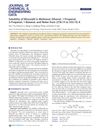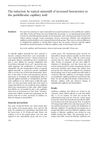 397 citations,
February 2004 in “British Journal of Dermatology”
397 citations,
February 2004 in “British Journal of Dermatology” Minoxidil boosts hair growth by opening potassium channels and increasing cell activity.
[object Object]  212 citations,
September 2008 in “Journal of The American Academy of Dermatology”
212 citations,
September 2008 in “Journal of The American Academy of Dermatology” Minoxidil and finasteride treat hair loss in men, while minoxidil treats hair loss in women.
 184 citations,
August 1983 in “The journal of pediatrics/The Journal of pediatrics”
184 citations,
August 1983 in “The journal of pediatrics/The Journal of pediatrics” Biotinidase deficiency has various symptoms and can be treated with biotin supplements.
 180 citations,
January 2003 in “American Journal of Clinical Dermatology”
180 citations,
January 2003 in “American Journal of Clinical Dermatology” Menopause can lead to skin and hair problems due to hormonal changes, but hormone replacement therapy might help slow these effects.
 152 citations,
April 2012 in “Recent Patents on Inflammation & Allergy Drug Discovery”
152 citations,
April 2012 in “Recent Patents on Inflammation & Allergy Drug Discovery” Minoxidil treats hair loss, promotes growth, has side effects, and has recent patents.
 138 citations,
May 2000 in “Maturitas”
138 citations,
May 2000 in “Maturitas” Estrogen replacement can improve skin health in menopausal women but doesn't reverse sun damage or prevent hair loss.
 137 citations,
June 2005 in “Climacteric”
137 citations,
June 2005 in “Climacteric” Estrogen loss during menopause worsens skin health, but hormone replacement therapy may improve it, though more research is needed.
 55 citations,
July 2016 in “Dermatologic Therapy”
55 citations,
July 2016 in “Dermatologic Therapy” Multiple treatments work best for hair loss.
 50 citations,
November 2010 in “Otolaryngologic Clinics of North America”
50 citations,
November 2010 in “Otolaryngologic Clinics of North America” Recognizing oral symptoms can help diagnose and treat blood and nutritional diseases early.
 44 citations,
October 2011 in “Gynecological Endocrinology”
44 citations,
October 2011 in “Gynecological Endocrinology” Menopause significantly reduces skin collagen, leading to thinner, less elastic skin, and hormone replacement may help but requires careful consideration.
 42 citations,
May 2016 in “Annual Review of Cell and Developmental Biology”
42 citations,
May 2016 in “Annual Review of Cell and Developmental Biology” Fat cells are important for tissue repair and stem cell support in various body parts.
 41 citations,
June 2003 in “Journal of The American Academy of Dermatology”
41 citations,
June 2003 in “Journal of The American Academy of Dermatology” Long-term minoxidil use can cause pseudoacromegaly, but stopping it improves symptoms.
 30 citations,
September 2004 in “Experimental Dermatology”
30 citations,
September 2004 in “Experimental Dermatology” Scalp hair follicle culture has limits for testing minoxidil's hair growth effects.
[object Object]  29 citations,
January 2009 in “Gynecological Endocrinology”
29 citations,
January 2009 in “Gynecological Endocrinology” Women with PCOS have higher levels of certain blood clotting factors, suggesting a greater risk of cardiovascular issues.
 28 citations,
November 2020 in “Fluid Phase Equilibria”
28 citations,
November 2020 in “Fluid Phase Equilibria” Minoxidil dissolves better in propylene glycol + water than in supercritical CO2.
 25 citations,
March 2017 in “Archives of Dermatological Research”
25 citations,
March 2017 in “Archives of Dermatological Research” Sinapic acid may help hair growth by activating a specific cell pathway.
 25 citations,
January 2002 in “Folia Pharmacologica Japonica”
25 citations,
January 2002 in “Folia Pharmacologica Japonica” Minoxidil helps hair grow by improving blood flow and increasing growth factors in hair follicles.
 24 citations,
April 2011 in “Journal of Chemical & Engineering Data”
24 citations,
April 2011 in “Journal of Chemical & Engineering Data” Minoxidil dissolves best in methanol and least in water.
 18 citations,
January 2004 in “Dermatologic Clinics”
18 citations,
January 2004 in “Dermatologic Clinics” Skin problems in older people can indicate hormonal diseases, nutritional deficiencies, or conditions like diabetes, menopause, and HIV.
 17 citations,
April 2020 in “Dermatology and Therapy”
17 citations,
April 2020 in “Dermatology and Therapy” The PRP-like cosmetic product with postbiotics effectively treats hair loss in Alopecia areata.
 17 citations,
June 2018 in “Frontiers in Physiology”
17 citations,
June 2018 in “Frontiers in Physiology” ADM scaffolds help skin heal by promoting a healing-type immune response.
 15 citations,
July 2019 in “Lasers in surgery and medicine”
15 citations,
July 2019 in “Lasers in surgery and medicine” The erbium-glass laser effectively promotes hair regrowth in alopecia areata.
 14 citations,
September 1991 in “Journal of Investigative Dermatology”
14 citations,
September 1991 in “Journal of Investigative Dermatology” Minoxidil slows down keratinocyte growth without being toxic.
 13 citations,
March 2013 in “International Journal of Cosmetic Science”
13 citations,
March 2013 in “International Journal of Cosmetic Science” AcSDKP may help prevent skin and hair aging and promote their growth.
 12 citations,
February 1999 in “British Journal of Dermatology”
12 citations,
February 1999 in “British Journal of Dermatology” Minoxidil increased small openings in blood vessel walls near growing hair in rats.
 11 citations,
January 2015 in “Skin pharmacology and physiology”
11 citations,
January 2015 in “Skin pharmacology and physiology” Eating collagen peptides may help with skin and hair growth.
 9 citations,
August 2021 in “Biological Chemistry”
9 citations,
August 2021 in “Biological Chemistry” ECM-inspired wound dressings can help heal chronic wounds by controlling macrophage activity.
 9 citations,
September 2011 in “Cutaneous and Ocular Toxicology”
9 citations,
September 2011 in “Cutaneous and Ocular Toxicology” Using 2% minoxidil for baldness treatment might cause vision distortion due to fluid build-up under the retina.
 8 citations,
December 2018 in “Journal of Dermatological Treatment”
8 citations,
December 2018 in “Journal of Dermatological Treatment” The PRP-like cosmetic with biomimetic peptides is potentially effective and safe for treating alopecia areata.
 8 citations,
January 1989 in “Annual Reports in Medicinal Chemistry”
8 citations,
January 1989 in “Annual Reports in Medicinal Chemistry” Hair loss from alopecia areata and androgenetic alopecia can be treated, but more effective and safer treatments are needed.






























